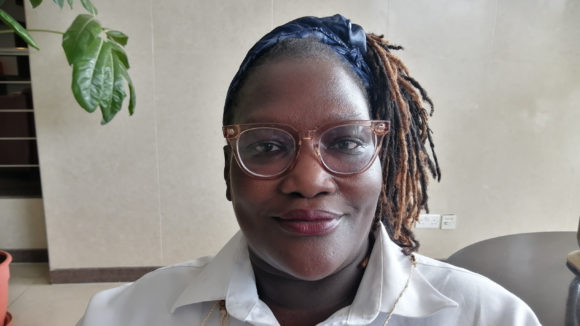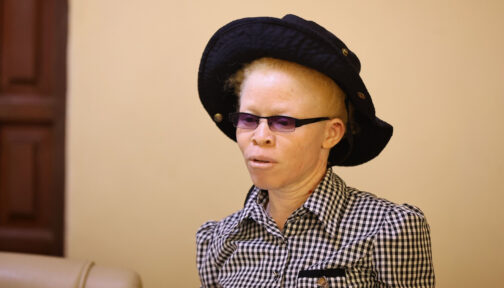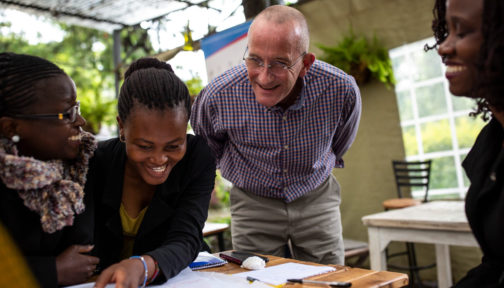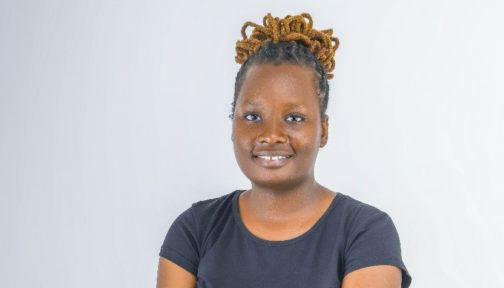Easter Achieng is the executive director and programmes coordinator for women’s rights and gender equality NGO, Kenya Female Advisory Organization (KEFEADO).
Under the Global Labor Program – Inclusive Futures, together with the organisation she leads, Easter is working to ensure that gender and social inclusion are embedded throughout the programme.
Here she explains why she’s passionate about championing women’s rights and raising the voices of people who have been marginalised.
Easter’s story
“I’ve been working on women’s rights issues for half my life. KEFEADO was founded by my mother, Dolphine Okech, who was an African feminist.
“I come from a family where women are given space to develop in their own area. My mother was a teacher, so I grew up with an understanding that access to education is a key entry point to economic empowerment and social inclusion.
“I originally trained as an accountant, which is key to KEFEADO’s programming and the way funds are implemented. But because of my experience of working for the organisation for so many years – I started working for the organisation in 1994 – I can say I’m an advocate.”
Addressing gender and disability discrimination
“My own experience of being unwell for a period and having a temporary disability, has given me an understanding of the challenges and barriers people with disabilities face. I was fortunate as I come from a place of privilege, so I was able to access quality healthcare and services.
“But there are many places where people with disabilities can’t access the services they need. Although Kenya’s constitution says that when you identify as person with a disability you should have equal access to services like anyone else, and the government says you should be taken care of, many people are still being left behind.
“Women with disabilities face double discrimination – firstly because they are a woman and secondly because they have a disability. Our society is still very patriarchal. Even within the disability movement, men tend to lead the conversations and women’s voices go unheard. When there are negotiations on labour rights, for example, men won’t talk about issues that women face like sexual harassment or gender-based violence. Women are given tokenistic roles and there is a lack of women leaders within the disability inclusion space.
“We want more voices, more faces, more diverse experiences shaping the conversations around disability rights. When we talk about disability, it’s important to remember there are different types of disability and this affects how women are treated. Women with physical disabilities are seen as being more acceptable, which means that women with intellectual disabilities are left further behind. We need to have women with all different types of disabilities shaping the conversation around inclusion.
“Our goal at KEFEADO is to eradicate any form of discrimination within our society. That means raising the voices of people who are being left behind and supporting them so they can speak up for their rights.
“Women with disabilities face a lot of stigma in our society. They’re often seen as asexual and children with disabilities can be defiled or forced into early marriages. Women who don’t identify as heterosexuals face further discrimination. At KEFEADO, we look at these intersectional issues around disability, gender and sexuality and how we can influence community attitudes and behaviour towards individuals.”
Influencing government policy
“Another key area of our work is focused on advocacy and working with partners to engage in the civic space and push for policy shifts at a local and national level. Where new policies are introduced, we work to ensure these are fully implemented and well financed.
“One example of this is the Kisumu County Disability Act, which was introduced by local government five years ago but still has gaps in its implementation. We’re working with disability rights and women’s rights organisations as well as other international organisations to raise awareness about the act and engage the relevant groups so they can participate in its implementation. Ensuring that information is shared at a community level, so it reaches the people that matter, is an important part of what KEFEADO does.”
Creating a ripple effect
“My hope for the Global Labor Program – Inclusive Futures as an economic and social justice programme is that it strengthens the women’s rights and labour rights movements.
“I hope that at the end of the programme it will keep spaces open for candid conversations to happen, for women with and without disabilities to engage at a community level with issues concerning their rights, and for women to start to take on leadership roles within the supply and value chains.
“Another hope is that this programme has a wider ripple effect on the communities involved and helps to change attitudes and behaviour towards women, on issues like sexual harassment and gender-based violence.
“This is an important time to be focusing on women’s rights and labour rights in Kenya. As the country recovers from the impacts of COVID-19, it’s important that we use this opportunity to raise women and young people’s voices and influence politicians so they commit to the changes we want to see. If we can make the most of this shift and anchor these issues around rights and social inclusion within this political context, we’ll then have a whole decade where we can measure change.”
Improving opportunities for women in Kenya
“When I think about what I’m most proud of, it’s pushing back barriers that we weren’t able to do years ago. It’s taken us a long time for us to get here but it shows what we can achieve if we persist. I’m proud that when the next generation of young women leaders engage on issues around women’s rights, inclusion and gender equality, they will do so from a more level ground.
“In my lifetime, what I would most like to see is equal pay for equal work and meaningful inclusion for women in society. Instead of women being given tokenistic roles within labour movements, I would love to see women and women with disabilities in positions of leadership.”



